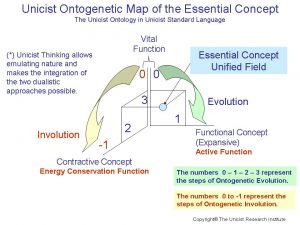The function of stem cells in the human body is homologous to the function of concepts in the field of human actions. While stem cells can give rise to specialized cells and thus organs, essential concepts allow building unicist objects.
 Unicist objects are adaptive systems that have a concept and generate added value within a quality assurance system to fulfill the purpose of the concept. Unicist objects are interdependent entities that integrate a complex adaptive system.
Unicist objects are adaptive systems that have a concept and generate added value within a quality assurance system to fulfill the purpose of the concept. Unicist objects are interdependent entities that integrate a complex adaptive system.
The knowledge of the essential concepts is basic to build unicist objects because these objects are the materialization of a concept.
Under certain conditions, organs can be transplanted and this is also the case of unicist objects that can be replicated as long as they belong to homologous and analogous entities.
Objects are inserted into processes to produce specific results. The same way stem cells have the potential capacity to give birth to human organs, concepts can give birth to objects to produce results.
The knowledge of the Unicist Theory allows using a double dialectical approach to reality to emulate the organization of nature using an object driven organization.
Nature is organized by objects which can be observed in the ecosystem. The human body is an example of the organization of nature, where organs are homologous to unicist objects. That is why the transplantation of organs became possible.
While the structure of the different organs of the body derives from the stem cells, the unicist objects derive from the essential function of an entity that is defined by its concept.
Properties of Stem Cells and Concepts
|
Stem Cells |
Concepts |
| They are unspecialized | They are universal |
| They are capable of self-renewal | They are timeless |
| They can give rise to specialized cells | They allow building operational functions |
Thus, stem cells and concepts are homologous. While essential concepts allow the construction of objects to insert into human adaptive processes, stem cells allow the building of organs that work as unicist objects to sustain the functionality of a complex adaptive system such as the human body.
Peter Belohlavek
NOTE: The Unicist Research Institute was the pioneer in using the unicist logical approach in complexity science research and became a private global decentralized leading research organization in the field of human adaptive systems. It has an academic arm and a business arm.
http://www.unicist.org/repo/#Unicist